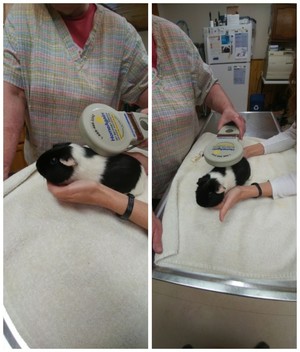 Oreo, the guineapig, gets scanned for her microchip!
Oreo, the guineapig, gets scanned for her microchip! This tragic story should serve as a reminder to all of us that NO fencing is 100% dog proof and collars break or fall off. At Bayfield Animal Hospital, we treat a lot of hit-by-car dogs who got free of their yards, leashes or outdoor tie-outs. We also get a LOT of dogs and cats who are dropped off because a good Samaritan found them wandering. Sadly, most of these pets have lost their collars and don't have chips. I'm grateful that so far, I haven't been in the position of the Vet in Florida but that's just good luck. This tragedy is all too common and entirely preventable.
In fact, just yesterday a stray dog showed up who HAD a chip. We scanned and that dog was home with her family that morning!
So, how do you prevent something tragic from happening to your furry family?
Microchips!
A microchip is a permanent identification - a small chip the size of a grain of rice that is placed between your dog or cat's shoulder blades. Placing the chip can be done in a regular appointment - no sedation needed. The chip carries a number sequence that is unique to your pet - NO other pet has the same number. When a pet is brought into a Vet clinic or an animal shelter, the very first thing staff does is scan for a chip. A scanner will read the chip number. Then staff can contact the chip company. That number is registered to YOUR contact information. The company calls you and you are reconnected with your pet!
Does it work? YES!
In a study of more than 7,700 stray animals showed that dogs without chips were reunited with their families only 21.9% of the time, but dogs with chips made it home 52.2% of the time! It's even more stunning for cats. Only 1.8% of the time did a stray cat make it home, but 38.5% of microchipped cats were united with their families! (Lord et al, JAVMA, July 15, 2009)
How does it work?
1. We will place a microchip in an appointment. You will fill out paperwork with your contact information and we submit that paperwork to the microchip organization. That's it!
2. If you ever move, you just need to call the organization to update your information so that when your pet is scanned, the chip still traces to you.
3. If your pet gets lost, the Humane Society or Vet clinic will scan for a microchip. Then, the chip company contacts YOU to get your friend home. Your contact information is completely private - only the chip company can contact you.
Keep in mind, MOST of the pets adopted from the Humane Society are chipped already. This chip is registered to the Humane Society, NOT the new family. Make sure you update your pet's chip information when you adopt a new dog or cat!
We recommend that all cats and dogs, regardless of lifestyle, be microchipped. It's a non-invasive, painless procedure that could save your pet's life! Call us today to schedule your pet for a microchip or to check and see if your pet is microchipped already!
 RSS Feed
RSS Feed
